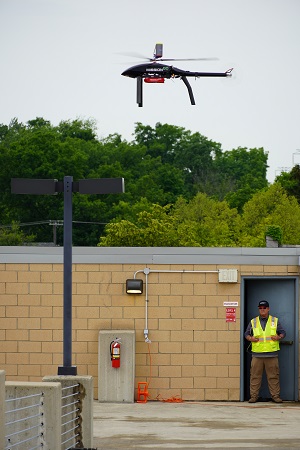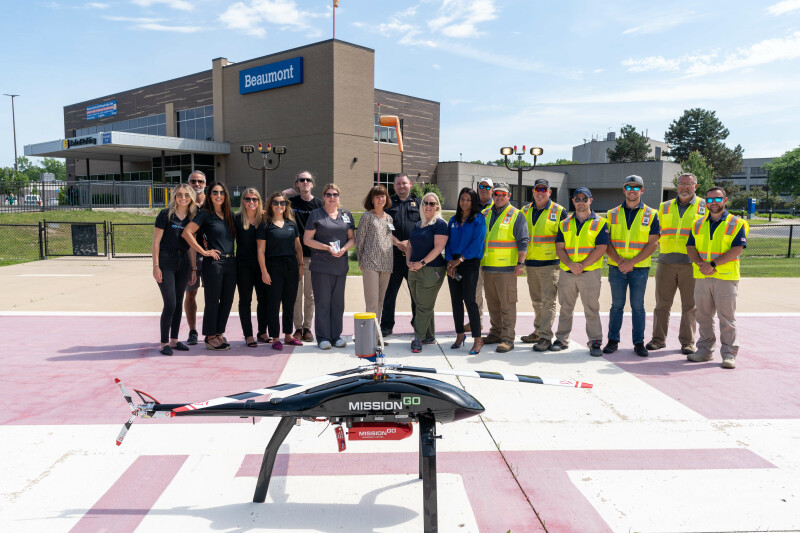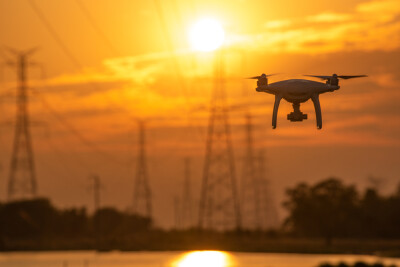In June, the drone safety infrastructure company Airspace Link and its partners completed a pilot project in Michigan to demonstrate the value of delivering medical supplies and other cargo by uncrewed aircraft vehicle.
For the effort, dubbed “Operation Miracle Mile,” MissionGO’s MGV100, an uncrewed, small-scale, rotor wing aircraft, was loaded with a box of blood samples and medical essentials by clinical staff from Taylor Beaumont Hospital. Flights took place in two locations over 10 operational days.
The first flight operation took place at Taylor Hospital where the vehicle flew from a helipad in a repeated closed-circuit route at a speed of 35 mph for approximately 1.5 miles. After a trip of about 22 minutes, it landed back at the helipad and was unloaded.
 The second flight operation location was between the Beaumont Wellness Center in Birmingham and a neighboring parking garage one mile away. The aircraft was loaded with medical supplies and cargo and sent back and forth several times over the course of 10 days to show how efficient and safe drone deliveries can be for improving patient care.
The second flight operation location was between the Beaumont Wellness Center in Birmingham and a neighboring parking garage one mile away. The aircraft was loaded with medical supplies and cargo and sent back and forth several times over the course of 10 days to show how efficient and safe drone deliveries can be for improving patient care.
“Through this pilot, we wanted to prove to companies that this can be a faster and more economical way to deliver certain medical supplies, and that it’s better for the environment,” said Casie Ocaña, Airspace Link’s Vice President of Marketing. “We want to show them that they can adopt the technology into their workflows and show them how long it will take to recover their upfront costs and reap the benefits.”
The project was funded through a grant from the Michigan Office of Future Mobility and Electrification. Along with Airspace Link and Taylor Beaumont Hospital, the uncrewed systems provider MissionGO, the Michigan Economic Development Corporation, Detroit Region Aerotropolis, Wayne County, the City of Taylor, and others contributed to the effort.
“With funding through the grant, we were able to lay the digital infrastructure for these operations. In addition, we are collecting data from these operations to include in a larger feasibility study for the state,” Ocaña explained. “We focused on medical delivery because we are trying to show that this technology isn't just great for getting your Starbucks delivered, but it will have maximum societal benefits.”
Through the demonstration project, Airspace Link and its partners hoped to present proof to the medical community that advanced air mobility is a viable compliment to using ground vehicles and helicopters to move critical cargo. “We're focused on medical package drone deliveries as a kind of ‘first mover’ technology,” Ocaña stated. “We think this project will help with the adoption of drones because people can really see the positive benefits they bring to the medical field, particularly the ability to deliver blood and medical supplies as quickly as possible.”
Drawing on the lessons learned from the demonstration, Airspace Link and its partners plan to publish a report. Ocaña said that the report will aim to guide Michigan in adopting drones for a variety of operations. In addition, the company will perform an analysis to determine the impact of the technology on transportation services and the environmental benefits.
“We’ll be doing a transportation impact analysis for the state of Michigan that could be translated to any location in the state,” stated Ocaña. “The work will mostly focus on reducing carbon emissions and vehicle miles traveled.”
The analysis, Ocaña explained, will further Michigan’s interest in finding ways to move people and goods more efficiently. “Due to the automotive industry being here, we have high weight limits on our roads. That leads to poor road quality, and that may not be conducive to long-term growth,” she said. “So, we're focused on getting certain vehicles, especially ambulances, off of the roads and finding alternatives. Our drone demonstration project and this analysis could help with that effort.”















Comments